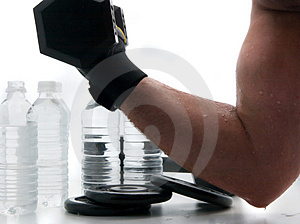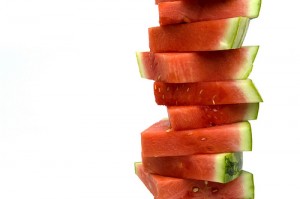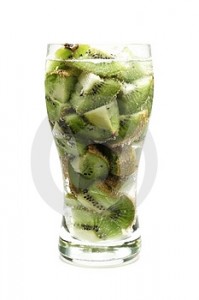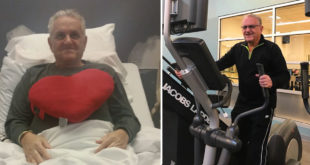by Michelle Sutton-Kerchner
“See you later!” is often followed by “Stay hydrated!” on these 100-degree days. With summer’s baking temperatures, cool yourself from the inside out …
Hydration is essential for our health. It helps prevent fatigue (including of our organs), eliminates toxins from the body, and quenches thirst. You can also maximize your fitness routine by staying hydrated. Proper hydration allows your body to perform at its best. In hot months, we need to be especially diligent about replacing fluids lost through exposure to the heat. This loss is compounded during exercise.
How Dehydration Affects Exercise
Exercising while dehydrated compromises performance. Your heart rate increases eight beats per minute for every liter of sweat lost. Hence, the suggestion to consume two cups of water for every pound of fluid lost during your workout session. This can be accomplished by weighing yourself before and after exercising during high-intensity and long-duration workouts.

The body cools itself through perspiration. Without enough water in your body, perspiration becomes impossible and you overheat. After only 30 minutes of exercise, an increase in heart rate combines with this insufficient cooling and causes elevated body temperatures. In addition to sacrificed performance through muscle weakness and fatigue, you become susceptible to heat-related illnesses.
Avoid dizziness, fatigue, and, ultimately, having to cut your workout short as a result of these and other symptoms of dehydration. Bring your water bottle along.
In addition to sipping water throughout your workout, two to three cups of water are recommended pre- and post-workout. Experts also suggest starting each day with a large glass of water, regardless of activities planned for that day.
How Fluids Help
Water allows muscles to remain toned. It helps them in their natural ability to contract. Well hydrated, the body can function properly by keeping fluids in perfect balance. This harmony allows more fat to be used as fuel so each workout is optimized.
Many rush to the Center without having anything to drink or eat, especially some dieters who mistakenly think skipping a meal and exercising accelerates weight loss. The opposite is true: The body needs fuel and fluids to function properly and efficiently.
Common Signs of Dehydration
If you suspect you’re becoming dehydrated, it’s important to act quickly. Heat-related illnesses can strain the body’s performance to the point of needing emergency care. Common signs of dehydration include:
- Infrequent urination or dark yellow, sometimes brownish urine. The clearer the urine, the better hydrated.
- Extreme thirst and dry mouth.
- Headache.
- Lack of tears when crying.
- Dizziness, lightheadedness, or fainting.
- Fatigue.
Whether experiencing these symptoms during a workout or otherwise, immediately consume clear fluids, preferably in a cool location. The Center’s nurse can check your vital signs and assist you in becoming hydrated during such an occurrence. Exercise often requires replenishment of glycogen stores and electrolytes, along with the fluids. Sports drinks are recommended in these cases. Consider diluting sports drinks with water if sugar content is high. High sugar content can delay absorption.
Did You Know?
Humidity adds to the risk of dehydration. Humid air prohibits effective evaporation of sweat so it can’t cool you as it normally would. This leads to increased body temperature and the need for more fluids.
Foods to Quench Your Thirst
 Water can be boring. Many even find adequate water consumption to be a daunting task. Retail capitalized on this distaste. You can now purchase flavored water, water with and without vitamins and minerals, and even flavored powders promising to jazz up any random cupful. Although you won’t find this selection in a crisp mountain spring, it might make consumption tolerable for those who’d rather sip Snapple.
Water can be boring. Many even find adequate water consumption to be a daunting task. Retail capitalized on this distaste. You can now purchase flavored water, water with and without vitamins and minerals, and even flavored powders promising to jazz up any random cupful. Although you won’t find this selection in a crisp mountain spring, it might make consumption tolerable for those who’d rather sip Snapple.
Consider replenishing fluids with foods. Not often thought of as an option, many fruits and veggies contain sufficient amounts of water. They’re also refreshing when temps are high and hunger is evading you. Fruits high in water content include watermelon, plums, cantaloupe, kiwi, grapefruit, berries, and apples. Broccoli, cucumbers, celery, and peppers are good hydration vegetables. If hydrating with vegetables, it’s best to crunch on them raw. Cooking absorbs their natural moisture. Buying in-season produce results in less packaging time and more hydration benefits.
Heavy foods and dairy can make you feel queasy and more sluggish in the heat. Dense foods generate more heat. If you can’t do without your favorite summer scoop of ice cream, try replacing it with dairy-free sorbet.
Nuts and other salted snacks (in moderation) keep sodium levels stable. Complement these handfuls with a long drink of water. Almonds are loaded with benefits, including heart healthy ones, with nutrients that help keep up energy levels.
Soup is a great way to boost fluid level with the added benefit of nutrients. Choose broth-based varieties as opposed to chowders and bisques. Gazpacho is ideal for hot summer days, with its chilled, light tomato-based broth and fresh raw veggies. Its unique combination of crunchy solids and cool broth quenches hunger.

Avoid alcoholic and caffeinated beverages. Although an iced coffee or cold beer might seem like a satisfying solution on a hot day, these can actually dehydrate you. Be especially cautious if consumed during outdoor activities in the hot sun. If you do indulge, follow up with an equal serving of water.
Not Just from Sweating
The heat and humidity of summer, and any physical activity performed during it, increases opportunities for dehydration. However, hydration can also be an issue in other instances. Stomach illnesses that cause vomiting or diarrhea, fever viruses, and flu can leave one susceptible to dehydration. Monitor occasions when fluid intake does not adequately replace what is lost throughout the day. You may simply have gotten too busy and forgot, or lack access to safe drinking water during a hike or trip. Take preventative action.
Here’s to You
Never deny your body’s thirst. Whether you quench it with a piece of juicy fruit or a tall glass of water, heed the need. Cheers!
Sources
American Council on Exercise.
“Dehydration,” at www.mayoclinic.com.
“How Much Water Should You Drink?” by Elizabeth Quinn at www.about.com.
Image Credits
Lemon Water (introductory photo): © Kornwa at www.dreamstime.com.
Hydrated fitness: © Gordon Swanson at www.dreamstime.com.
Pile of watermelon slices: www.flickr.com/photos/34547181@N00/4203890837/
glass of kiwi: © Dmitry Maslov at www.dreamstime.com
 Fitness & Wellness News Your Source for Fitness News, Wellness News, Health News, and Nutrition News!
Fitness & Wellness News Your Source for Fitness News, Wellness News, Health News, and Nutrition News!



